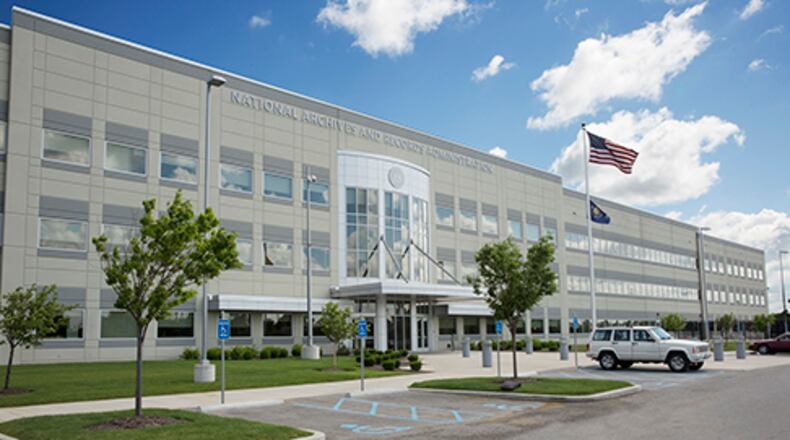But in December, the family and funeral home were not able to reach anyone at the center at all, Farmer said.
“We were not able to have any military presence at all at his funeral,” said Melissa Hoaglan, Jack Hoaglan’s daughter-in-law.
Farmer called it “absolutely heartbreaking.”
“What do I tell that family?” he said Friday. “We can’t bring that veteran back.”
U.S. Rep. Warren Davidson plans to visit the head of the National Personnel Records Center in St. Louis Monday to express concern about what he believes has been the glacial pace at which crucial veterans’ records have been made available during the pandemic.
It’s more than paperwork. Personnel and service records from federal government archives make it possible to build a complete service history — something needed for veterans and families to establish accurate service records, obtain Veterans Affairs (VA) medical care, receive service awards or even burials with military honors, said Davidson, R-Troy.
There have been sporadic attempts to reopen the center, but today the backlog appears significant — Davidson’s office puts the number of the backlog at about 480,000 requests for records, citing the Congressional Research Service. Davidson’s staff referred to a VA website (https://www.benefits.va.gov/reports/detailed_claims_data.asp) that posted a total number of pending claims of more than 475,000 as of March 27.
But in a press release issued Thursday, the VA cited a far lower number, saying there are more than 25,000 pending requests for personnel records.
Credit: Uncredited
Credit: Uncredited
“That’s over 1,000 cases on average per congressional district,” said Davidson, who intends to meet with Scott Levins, director of the National Personnel Records Center in St. Louis, referring to the 480,000 figure. “That’s unacceptable.”
The center is losing ground in efforts to respond to requests, Davidson said in an interview. Due to the pandemic and need for social distancing for the staff, the center fell to 25% capacity on one shift for much of the year.
When Congress became aware of the issue last fall, members urged center personnel to address the issue. In December, Congress appropriated about $15 million to assist, Davidson said.
According to Davidson the center pledged to shift to 25% capacity on a second shift — which was a step in the right direction, but didn’t truly solve the problem.
“You don’t have to be a math major to see that you can’t get a 100% result with a 50% staffing level, unless maybe you were overstaffed by 200% or something,” Davidson said. “So that’s the concern.”
Davidson said his main message to Levins will be simple. “You’ve had three months and $15 million. What’s the plan?”
On Friday, National Archives media representatives responded to a message from the Dayton Daily News by releasing a letter from the head of their agency, Archivist of the United States David Ferriero, to congressional committee chairs and ranking members.
The letter says community health metrics in St. Louis and surrounding counties have improved, allowing NPRC to increase staffing on site.
“The additional on-site staff have improved our responsiveness on our most urgent requests,” Ferriero wrote. “We continue to operate two on-site shifts each day. This allows us to double the on-site workforce without exceeding the maximum safe occupancy limits ... . We also continue to work weekend shifts on Saturdays and Sundays, and we doubled the number of staff detailed to NPRC from the local VA regional office to support VA priorities.”
The Department of Veterans Affairs is aware of the issue. On Thursday, four days before Davidson’s scheduled visit with Levins, the VA announced that it had reached an agreement with the National Archives and Records Administration (NARA) to provide COVID-19 vaccines to NARA staff supporting VA claims processing.
VA will provide medical staff and enrollment specialists to administer the vaccine.
NARA employees will be scheduled appointments to get vaccines at an off-campus site, the VA said. The National Personnel Records Center is part of NARA.
“The staff at NARA play a vital role in making sure veteran claims for compensation for service-related conditions are processed in a timely manner,” Acting Under Secretary for Benefits Thomas Murphy said in a statement. “By assisting their vaccination efforts, we can make significant progress in processing the backlog in claims, which has increased since March 2020 due to the pandemic.”
Davidson and U.S. Rep. Deborah Ross, a North Carolina Democrat, wrote about their concerns in a letter to the Biden administration.
The letter asks the Biden administration to designate center employees as essential workers so they can have access to vaccines and testing. The letter also asks for a reevaluation of safety measures and to consider increasing staffing or overtime to address the backlog.
So far, some 150 members of Congress — from both parties — have signed on, according to Davidson’s office.
About the Author


